Craig Edward Moncrieff Brown is an English critic and satirist, best known for parliamentary sketch writing, humorous articles and parodies for newspapers and magazines including The Times, the Daily Mail and Private Eye.
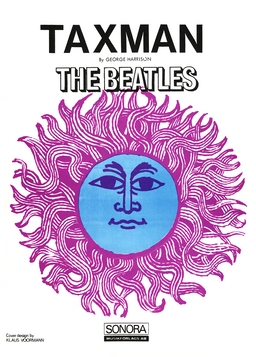
"Taxman" is a song by English rock band the Beatles, from their 1966 album Revolver. Written by the group's lead guitarist, George Harrison, with some lyrical assistance from John Lennon, it protests against the higher level of progressive tax imposed in the United Kingdom by the Labour government of Harold Wilson, which saw the Beatles paying a 95% supertax. The song was selected as the album's opening track and contributed to Harrison's emergence as a songwriter beside the dominant Lennon–McCartney partnership. It was the group's first topical song and the first political statement they had made in their music.
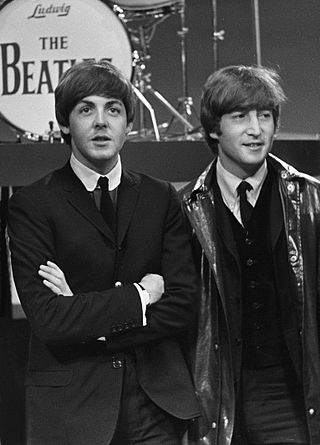
Lennon–McCartney was the songwriting partnership between English musicians John Lennon (1940–1980) and Paul McCartney of the Beatles. It is widely considered one of the greatest, best known and most successful musical collaborations ever by records sold, with the Beatles selling over 600 million records worldwide as of 2004. Between 5 October 1962 and 8 May 1970, the partnership published approximately 180 jointly credited songs, of which the vast majority were recorded by the Beatles, forming the bulk of their catalogue.

"And Your Bird Can Sing" is a song by the English rock band the Beatles. It was released on their 1966 album Revolver, apart from in the United States and Canada, where it instead appeared on Yesterday and Today. The song was written mainly by John Lennon and credited to Lennon–McCartney. The recording features an extended dual-guitar melody, played by George Harrison and Paul McCartney, which anticipated the harmonised guitar arrangements commonly used by Southern rock, hard rock and heavy metal bands.
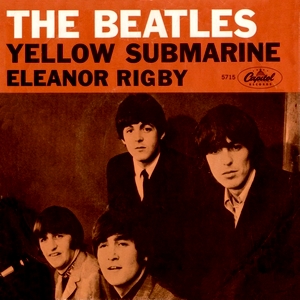
"Eleanor Rigby" is a song by the English rock band the Beatles from their 1966 album Revolver. It was also issued on a double A-side single, paired with "Yellow Submarine". Credited to the Lennon–McCartney songwriting partnership, the song is one of only a few in which John Lennon and Paul McCartney later disputed primary authorship. Eyewitness testimony from several independent sources, including George Martin and Pete Shotton, supports McCartney's claim to authorship.

"The Ballad of John and Yoko" is a song by the English rock band the Beatles that was released as a non-album single in May 1969, with "Old Brown Shoe" as its B-side. It was written by John Lennon and credited to the Lennon–McCartney partnership, and chronicles the events surrounding the wedding of Lennon and Yoko Ono. The song was the Beatles' 17th UK number-one single and their last for 54 years until "Now and Then" in 2023. In the United States, it was banned by some radio stations due to the lyrics' reference to Christ and crucifixion. The single peaked at number 8 on the US Billboard Hot 100. The song, along with its B-side, has subsequently appeared on compilation albums such as Hey Jude, 1967–1970, and Past Masters. It was also included on the compilation 1.

"The Fool on the Hill" is a song by the English rock band the Beatles from their 1967 EP and album Magical Mystery Tour. It was written and sung by Paul McCartney and credited to the Lennon–McCartney partnership. The lyrics describe the titular "fool", a solitary figure who is not understood by others, but is actually wise. McCartney said the idea for the song was inspired by the Dutch design collective the Fool, who derived their name from the tarot card of the same name, and possibly by Maharishi Mahesh Yogi.

"Your Mother Should Know" is a song by the English rock band The Beatles, from their 1967 EP and LP, Magical Mystery Tour. It was written by Paul McCartney and credited to Lennon–McCartney. Titled after a line in the 1961 film A Taste of Honey, its lyrical premise centres on the history of hit songs across generations. McCartney said he wrote it as a plea for generational understanding and respect for a mother's life experience. In the Magical Mystery Tour television film, the song serves as a big production number in the style of a 1930s Hollywood musical. Some commentators view the sequence as cultural satire, as the Beatles are seen dancing and dressed in white evening tails.
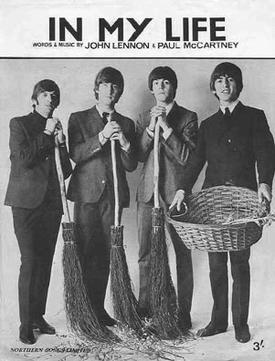
"In My Life" is a song by the English rock band the Beatles, released on their 1965 studio album, Rubber Soul. Credited to the Lennon–McCartney songwriting partnership, the song is one of only a few in which there is dispute over the primary author; John Lennon wrote the lyrics, but he and Paul McCartney later disagreed over who wrote the melody. George Martin contributed the piano solo bridge.
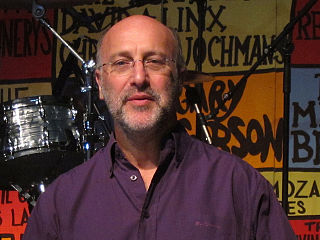
Mark Lewisohn is an English historian and biographer. Since the 1980s, he has written many reference books about the Beatles and has worked for EMI, MPL Communications and Apple Corps. He has been referred to as the world's leading authority on the band. His major works include The Complete Beatles Recording Sessions (1988), a history of the group's session dates, and The Beatles: All These Years (2013–present), a three-volume series intended as the group's most comprehensive biography.
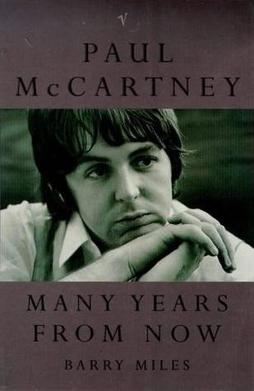
Paul McCartney: Many Years from Now is a 1997 biography of Paul McCartney by Barry Miles. It is the "official" biography of McCartney and was written "based on hundreds of hours of exclusive interviews undertaken over a period of five years", according to the back cover of the 1998 paperback edition. The title is a phrase from McCartney's song "When I'm Sixty-Four", from the Beatles' 1967 album Sgt. Pepper's Lonely Hearts Club Band. The book was first published in the United Kingdom in October 1997 by Secker & Warburg.

Two of Us is a 2000 television drama which offers a dramatized account of April 24, 1976, six years after the break-up of the Beatles and the day in which Lorne Michaels made a statement on Saturday Night Live offering the Beatles $3,000 to reunite on his program.
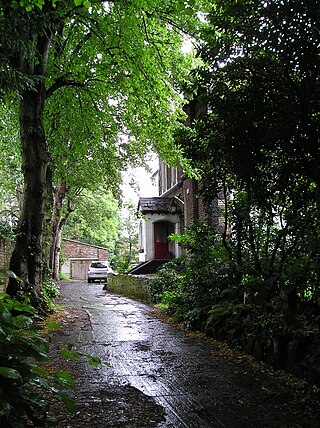
The Casbah Coffee Club, officially Casbah Club, was a rock and roll music venue in the West Derby area of Liverpool, England, that operated from 1959 to 1962. Started by Mona Best, mother of early Beatles drummer Pete Best, in the cellar of the family home, the Casbah was planned as a members-only club for her sons Pete and Rory and their friends, to meet and listen to the popular music of the day. Mona came up with the idea of the club after watching a TV report about the 2i's Coffee Bar in London's Soho where several singers had been discovered.
Philip Norman is an English author, novelist, journalist and playwright. He is best known for his biographies of the Beatles, the Rolling Stones, Buddy Holly and Elton John. His other books include similar studies of John Lennon, Mick Jagger, Paul McCartney and Eric Clapton.

The Love You Make: An Insider's Story of the Beatles is a 1983 book by Peter Brown and Steven Gaines. Brown was personal assistant to the Beatles' manager, Brian Epstein, a senior executive at Apple Corps, as well as best man to John Lennon at the latter's wedding to Yoko Ono in March 1969.
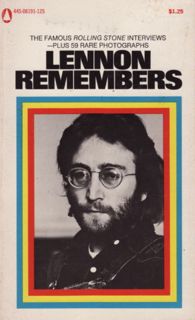
Lennon Remembers is a 1971 book by Rolling Stone magazine co-founder and editor Jann Wenner. It consists of a lengthy interview that Wenner carried out with former Beatle John Lennon in December 1970 and which was originally serialised in Rolling Stone in its issues dated 21 January and 4 February 1971. The interview was intended to promote Lennon's primal therapy-inspired album John Lennon/Plastic Ono Band and reflects the singer's emotions and mindset after undergoing an intense course of the therapy under Arthur Janov. It also serves as a rebuttal to Paul McCartney's public announcement of the Beatles' break-up, in April 1970.

The Beatles: The Authorised Biography is a book written by British author Hunter Davies and published by Heinemann in the UK in September 1968. It was written with the full cooperation of the Beatles and chronicles the band's career up until early 1968, two years before their break-up. It was the only authorised biography of the Beatles written during their career. Davies published revised editions of the book in 1978, 1982, 1985, 2002, 2009, and 2018.

The Beatles: Get Back is a documentary television series directed and produced by Peter Jackson. It covers the making of the Beatles' 1970 album Let It Be and draws largely from unused footage and audio material originally captured for and recycled original footage from the 1970 documentary of the album by Michael Lindsay-Hogg. The docuseries has a total runtime of nearly eight hours, consisting of three episodes, each of duration between two and three hours covering about one week each, together covering 21 days of studio time.

The Lyrics: 1956 to the Present is a book released in November 2021 by the English musician Paul McCartney and the Irish poet Paul Muldoon. It is published by Penguin Books Ltd in the United Kingdom, W.W. Norton/Liveright in the United States of America and C.H. Beck in Germany.

Living the Beatles Legend: The Untold Story of Mal Evans is a biography of the Beatles' road manager Mal Evans by Kenneth Womack. It was published on November 14, 2023 by HarperCollins.


















